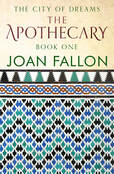I have lived in Málaga, on and off, for more than thirty years now, and love the city, which seems to get more interesting and more beautiful every year. It certainly is a very different place from when I first came here in 1988. In the al-Andalus series I have written at length about Moorish Spain, and Córdoba in particular, and felt that it was now time to discover what it must have been like to have lived in Málaga almost a thousand years ago, when it too was ruled by the Moors.
The Apothecary is the story of Makoud, a middle-aged man, who arrives in Málaga with his family, looking to make a new life for themselves. It is the year 1035 AD and Málaga is no longer ruled by the Omayyad dynasty who had held the country together for the last two hundred and seventy-five years. The Golden Age of Moorish Spain is over; Córdoba is no longer the cultural capital of the western world, and the country which had been a strong, united state is now in disarray. Al-Andalus had split into a number of warring princedoms, which were referred to as ‘taifas.’
Málaga was one such taifa, but with a difference; it was ruled by a caliph and not an emir. When Yahya I inherited the title of caliph from his father Ali ibn Hammud, he found he was no longer welcome in Córdoba, so he moved his court to Málaga and declared the city to be an independent taifa. However he soon found himself at war with his neighbours, in particular the taifa of Seville.So this is the turbulent city where Makoud and his family find themselves. At first life is good. Makoud opens his own apothecary shop and his sons find work. But when the caliph dies and rumours suggest that he has been poisoned, Makoud becomes worried that he may have sold the poison to the assassin. His eldest son decides to investigate the caliph’s death and soon finds himself caught up in a web of intrigue, lies and murder.


Recent Comments